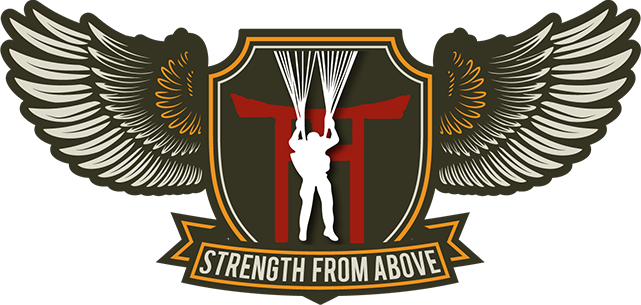Cpl. Walter, William R.
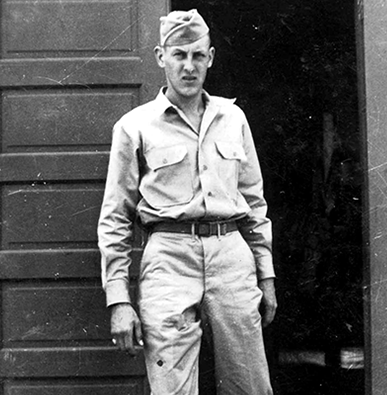
Mail Clerk, Company D, 511th PIR
April 21, 1922 - February 24, 2009 (Age 86)
Citations: Bronze Star, Presidential Unit Citation, World War II Victory Medal, Philippine Presidential Unit Citation Badge, Philippine Liberation Medal with service star, the American Defense Medal, and the Asiatic-Pacific Campaign Medal with three Battle Stars and one Arrowhead
I was born April 21, 1922 in Philadelphia, Pennsylvania. My mother and Dad had a neighborhood meat and grocery store there. I had one brother and one sister. I was working at Polish Inspection Plant 1, Department 24, a Bearing Factory at the time World War II began. I happened to see two paratroopers at the train station, and I really thought they were IT! I loved the uniforms and boots, the cocky way they wore their hats. I thought, “This is what I want to be”.
I was inducted into the Army at New Cumberland, Pennsylvania on January 1943 and took Basic Training and Jump Training at Ft. Benning, Georgia. After all the hullaballu, the jumping was duck soup!
Here I am, sitting on my porch, sixty years later, trying to recollect things that happened when we were taken into the service. It’s all kinda weird. For anybody who has not been in the service, I guess it was all surprising. This is not in any sequence or special form; as the ideas pop into my head, I am just saying them. I’ll call them my...
RANDOM THOUGHTS OF “D” COMPANY
(Jane Carrico’s note: My only changes to these wonderful tales is to try to group them, as best I can in sequence and time frame. The 'hehehes' and 'hohohos' sprinkled throughout are Walter’s chuckles as he recalled a story)
One of the things that I always liked when we actually were preparing to jump was all the preparation even though it was so grueling. But the glory part was really the best part, when we got to make our jumps. Boy, it was supposed to be a tough thing. But in reality, we went to the packing shed and checked out our chutes and then sat there. They called us up and we loaded up the plane and jumped; and Geeze, that was all we had to do all morning! That was a break in the service if we had all that time and it only took about 5 minutes, I guess. We loaded up the plane and jumped out and came back, gathered up our chutes and took them in, and that was the end of the line.
Talking about chutes, that was a funny one, too. We had a helper. I helped him and he helped me pack our chutes at really long tables that looked like shuffleboard tables about 20 - 30’. We stretched out our chutes and the important part was to make sure that the shroud lines were even and not tangled up. We had to run our fingers all down to make sure that they were all good - not turned around or snagged. That took a while to make sure everything was right. Of course the silk part was easy, we just folded it over and laid shot bags which were about a foot and a half long and 3 inches in diameter, filled with bbs and laid them on the silk because if the silk was squeezed and let go it flies up after we get it all smoothed down. So the shot bags were laid on the silk to keep it from flying away. Then we just worked on the lines to make sure they were all good, bringing them up and fastening with rubber bands to they wouldn’t fly apart. After getting all that done, we put my chute away and helped my partner with his.
One day, we had been in the waiting area for some time, and I guess I was leaning on the wall and this little Sgt spied me lounging. He made a rhyme: “Sgt Small was on the ball – he caught Walter leaning on the wall” He said “OK, Walter, put a shot bag on each shoulder and duck walk around the hanger”. That hanger must have been eighteen miles long - it sure felt like it!. As I was going around there, Sgt. Small said “Now Quack” while you’re doing it. Oh man, talk about brutal. Did you ever duck walk? And with shot bags on the shoulder - there I go, holding them on, quacking all the while. A couple of guys laughed at me. I think it was Red Illes and Dick Goff. Sgt Small said: “Oh, you think it’s funny”. He made them do it. They were really mad at me for awhile, but I said, “It’s your own fault – you shouldn’t have laughed at me.” hahaha….
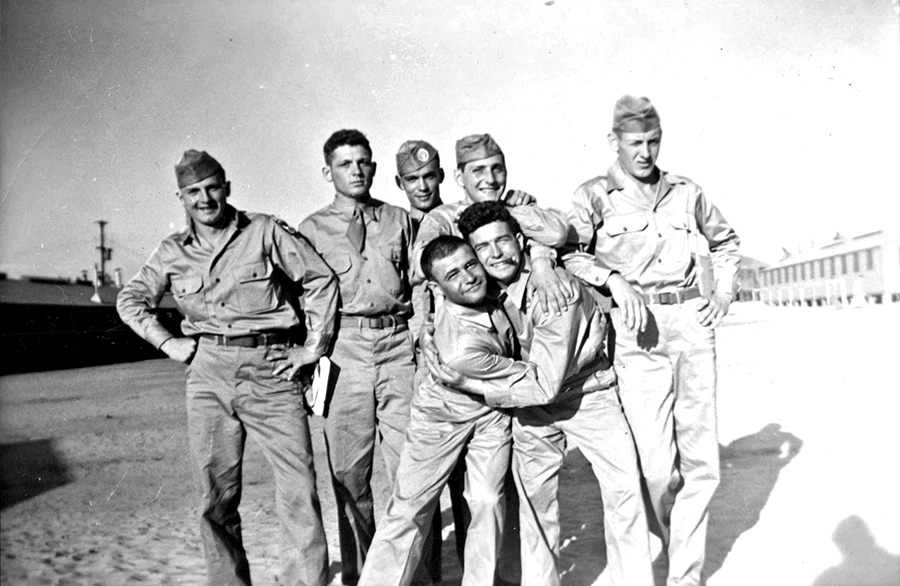 After Benning, I had all the usual Squad, Platoon, Company maneuvers. I loved Demolition School. On graduation day they gave us a box of dynamite to make our own grenades. I attended Sniper School. (Cpl. Walter is on far right of photo taken at Fort Benning)
After Benning, I had all the usual Squad, Platoon, Company maneuvers. I loved Demolition School. On graduation day they gave us a box of dynamite to make our own grenades. I attended Sniper School. (Cpl. Walter is on far right of photo taken at Fort Benning)
Our first encounter in the military was the officers and non-coms, mostly. We were fortunate in that respect. We had a little Jewish fellow from Bronx, New York who had been a tank scout in Patton’s outfit for a while in basic training – apparently that was not adventurous enough for him and he went on to become a paratrooper, which was fortunate for us, as he ended up as my squad leader. We had a platoon leader at the time, Sgt. Sharp, nice gentleman and we had our two officers, Lt. Clark and Lt. Kannely, both nice gentlemen. We were fortunate in that respect as we were broke in by nice officers. Initially our first CO was Capt. Roth. We had a succession: Capt Faulkner, Capt. Freeman and we ended up with Capt Cavanaugh (who came along later). This was some of our hierarchy. Officers and enlisted men did not fraternize.
Now getting down to the platoon people, that is a different story. They came from all walks of life, from all parts of the country. We had Red Illes, a Cajun from down in Louisiana, Dick Goff, a hot shot from Buffalo, New York, a ladies man; Jim Stott, my good friend. Don Rasmussen, Don (DJ) Hyatt and I played pinochle the whole time we were in service, I think. Whenever we had a free moment, we were playing pinochle, and the three of us took lessons from Jim Stott who had a lot of experience in the game. He used to play in a fire house up in Chicago, Illinois where he was from. He was a little older than us, and we paid for his lessons (hehehe). He always won the money. That was some of the things we did for entertainment. As mentioned above, Officers and enlisted men did not fraternize. One of the officers passing by watched us playing pinochle, and he wanted so badly to learn the game, but did not, of course…I wonder if he ever learned the game.
I was assigned as the mailman. Being in that position have me an opportunity to know everybody, not just my own Platoon, and I had good rapport with all my comrades. I didn’t like the Army much, but liked all my pals. I knew who was getting a “Dear John” letter, and I served with a group of young, patriotic and daring soldiers. Most never considered the consequences of their pranks, comradeship was high by the time we went oversees, and they planed their escapades, and then stood up with each other to the end. Sometimes “The End” was of their comrades’ lives in combat, or the “Million Dollar Wound” which sent many of them home. There were, of course, slackers and goof-offs, who did not want to be in the military, and these men were easily spotted and became the subject of ridicule or isolation from the Unit.
Some of the other enlisted men: Village Center, a Blackfoot Indian, was probably the best athlete we had in our Company. He could do everything. He could shoot, he could run, he could do anything you name athletically. There was only one way we were able to get him steamed – he never said much. But I could get to him. He was so proud of Jim Thorpe, and I would say, “Who the hell is that?” And that would get to him.
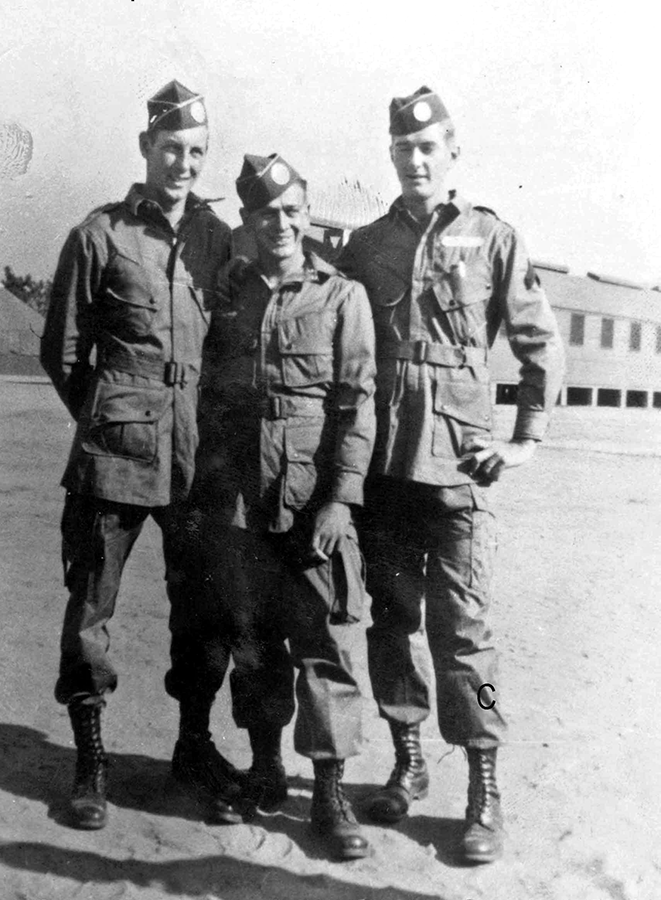 Oh, we had some good times at Camp Mackall! Stealing was a big source of adventure for most the soldiers. Coveralls had to be kept clean. There were choices of washing one’s own coveralls, or sending them to the laundry (which required payment). Don Rassmussen, another nice fellow, was a real character. “Dirty Gerty” we called him. He washed everybody’s coveralls on weekends at a dollar a shot. He stayed on his knees for two days in the latrine with brushes and GI soap scrubbing coveralls. He hung the coveralls out on racks to dry, and they often disappeared. If a soldier’s coveralls were stolen, he just stole another pair to replace them, and so on. By payday, he ended up in pretty good cash shape. Everybody owed him five, four, three, or six dollars apiece. He ended up making a nice bit of loot. The officers frowned on that, but hey, he was an entrepreneur in his own way.
Oh, we had some good times at Camp Mackall! Stealing was a big source of adventure for most the soldiers. Coveralls had to be kept clean. There were choices of washing one’s own coveralls, or sending them to the laundry (which required payment). Don Rassmussen, another nice fellow, was a real character. “Dirty Gerty” we called him. He washed everybody’s coveralls on weekends at a dollar a shot. He stayed on his knees for two days in the latrine with brushes and GI soap scrubbing coveralls. He hung the coveralls out on racks to dry, and they often disappeared. If a soldier’s coveralls were stolen, he just stole another pair to replace them, and so on. By payday, he ended up in pretty good cash shape. Everybody owed him five, four, three, or six dollars apiece. He ended up making a nice bit of loot. The officers frowned on that, but hey, he was an entrepreneur in his own way.
Photo at Right: L to R: "Kurt", Pfc. Joseph W. Vernon, Cpl. William R. Walter. Taken at Camp Mackall. Photo by William R. Walter.
We used to have a Saturday inspection at Camp Mackall: We had to get our rifle in shape, shoes shined, our uniforms looking good, etc. One day Jonsey and a couple of other fellows were playing poker. I remember he had cleaned his rifle and got gun oil on his coverall. It was getting closer to fall out time and they were saying “Jonsey, you better get cleaned up”, and he didn’t know what to do, he didn’t have time to change, so he took some lighter fluid and a ball of cotton and wiped the gun oil off his coveralls. So he got out in line and somebody said, “Hey Jonsey, what’s that on your uniform?” “Oh”, he said, “That’ll go away – it’s lighter fluid”. Somebody said, “Let me see”, and he lit a match, and Christ! Jonsey got on fire! He’s running around on fire and they tackled him and rolled him in the sand. 1st Sgt Fillippelli’s just standing there with his mouth open- he don’t know what’s going on and there’s this fireball, Charlie Jones! Another one of Charlie’s little tricks!
At Camp Polk, it was fun to tantalize Dubes about the time he went with Vaughn and a couple of others. They had to go far afield to get to a place where there wasn’t competition for the girls, so they found a town somewhere in Texas. Ends up Dubes got married. But he was so drunk he couldn’t consummate the marriage so they had it dissolved. Reminded me of the old story about the fellow who said he never went to bed with an ugly woman, but he sure as hell woke up with a few.
Stealing was a way of life. One time on New Guinea, I stole a DUCK. I don’t know why I did that. They were like a boxcar and you stand up and drive the wheels like horizontal. My co-conspirator, Johnson who was a screwball from Ohio was pushing buttons and there were buttons there to change the tires for coral, sand, water, or land. The DUCKS were loaded on the boats, and then came right on in to the beach to load off the supplies. Johnson was pushing buttons, and he inadvertently pushed the button for coral, changed the inflation of the tires, and the darn wheels collapsed on them, slowing the DUCK down, just like putting on the brakes, and leaving us high and dry. “Hey, I said, It’s bad enough these things are so cumbersome . we’re going to get caught by the MP’s” “What the hell you doing that for?” He just laughed.. He was a nut.
Stealing Jeeps was another occupational pastime. We would filch one to ride around to see buddies in other units. Some of the fellows carried a rotor cap in their pocket. We never had any, but we’d get where the Air Force was (I think everybody in the Air Force from corporal up had a Jeep) so when we were around the Air Force we always had transportation because we would steal the Jeeps. They said when we left New Guinea they had all this stuff in the back behind the Kunai grass – said it was ridiculous. – it was like a parking lot. I think we had half everything in the Air Force mechanical contrivances back there: Jeeps, troop carriers, whatever.
I recall a funny story on Bill Dubes while we were in Camp Mackall. The guys called him “Whiskey Bill”. When he went into town you can bet that he came back pie-eyed. One time, I don’t know if anybody remembers, the cab driver bringing him back rolled him and dumped him out in the ditch, all disheveled and his money all gone. 1st Stg. Thomas, I think, the 1st platoon leader saw what happened, and he knew the name of the cab company involved, in this little town in North Carolina. Thomas got permission to go into town and took the platoon with him. They went to the parking lot of the cab company and turned all the cabs upside down, then returned to camp on a bus.
There was one thing about Dubes. He was one of the smoothest boxers. Very good. He had, I think a Golden Gloves champion in North Dakota. We had Jonsey, Bill, Whelen, Village Center and Big Moose Hanna who was a heavy weigh champ. He was a big Oaf. – A real goof-off, too.
One time Jonsey was boxing with another outfit and was winning. Colonel Haugen, the Commanding Officer happened to be watching and overhead Jones say, “I’m tired – you beat on me for a while”. Apparently Haugen got a chuckle out of that match.
Sgt Thomas was a good non-com, but he finally transferred because he could not get along with 1st Sgt. Fillippelli. When the 504th was going oversees, they were trying to fill their TO, and anyone from our outfit who wanted to volunteer to go with them could transfer. A little fellow named Douglas went with him. I remember Douglas because of the three ropes for physical training, where we had to climb up the first rope, cross over to the third one and then come down again. Douglas got about half way up and could not go any further and there he was, stuck in the middle. An English officer named Kirkland, shouted “Douglas, what in the horrible hell are you doing there – bivouacking?” After that episode, we kidded him when he couldn’t go one way or another, “Douglas, you’re bivouacking!”
Gebo was a piece of work. He was probably the strongest man for hi size of anybody you ever saw. If he had been 6’4” he could have been a Greek statue. He could do 100 pushups if he had to, no problem. Gebo was always in trouble – one of those guys trouble followed around. He was in the mortar squad, 2nd platoon. He and Tacket alternated. Gebo would screw up and Tacket would take over. Tackett eventually got the job, because he wasn’t a screw-up like Gebo.
In Camp Polk, before we went to POE there was a time when we could have our wives and girl friends visit, and I had Lois visit and quite a few of the other fellows: Red Illes had his lady and Vaughan had his girl, and Tommy Sickenberger had his wife there:. A whole group of fellows and girls. We had a band and we went to a concert with Red Illes and his girl friend Fluffy, and Lois. Murray Perlman was sitting a few rows in front of us. I knew how shy he was and so we decided to do something funny – So we asked Fluffy and Lois to go around on each side and kiss him on each cheek. Ah...they did that, and Murray turned so red, and he came back and said “I’m not ever going to wash my face”.
One of the events from the same time period was my article in the magazine where I talked about Village Center winning the race. Hyatt and I told him he was chicken, because he said he could not run because he had ingrown toenails and it would make them bleed. He took the bet, and he said “Alright, I won’t win the race but I will beat the Sioux” (That was the Indian from E or F Company, I think.) If you remember the article, he beat everyone. He came romping around that corner and I said to DJ “Oh my God, it’s him – we owe him a case of beer.”
Talking about feet: Little Bobby Burnside in 3rd platoon had a size 5 ½ quadruple E. He was the only trooper I knew who had extra custom-made jump boots. They always made him a couple of pairs and gave them to him, and he had to carry them along when we moved about
Bobby Ingram was another real athlete. A young fellow who could do anything. He could run and do a flip completely in the air without touching his hands to the ground. He played baseball, he was just a real good athlete all way round. It was really ironic. He got shot on Luzon in the spine and was paralyzed from the waist down. What a really tragic thing for a guy with his demeanor.
Before we went overseas we had to come up with what they called TO. We were short men, so we ended up getting a big batch of replacements. One of they in particular you will remember was a guy named Wilbur Wilcox. I was considered the historian because I could remember things way back then. But after Wilcox came, I have to bow my head to him. That guy remembered events, people, really terrific. I could remember things before his replacement, and he took over after he came in. Between us, we could fill in a lot of blanks, just the two of us sitting down and talking together. In fact, at one of our reunions, he was sitting at the table talking about the war, and Lois wanted me to go somewhere shopping or something. Wilbur asked, “Where are you going”, and I said, “Hey, I have to go out with Mom”, and he said “AHH”…..He just wanted to sit and talk. We re-hashed the war at every reunion. Any of his old buddies around would join us as we sat there “yak, yak, yak”. And we could practically feel the mud beneath our feet when we finished remembering.
At Camp Stoneman, several of us sneaked out of camp and stole three cars, and rode to town. Asked about the consequences of getting caught: “Hell, we were young, brave and thought we could do no wrong.” “Besides, we knew we were going overseas soon, and the brass was not so likely to set down hard on us.”
I recall a little fellow named Howie – nice fellow. He got put out eventually because his feet were so bad. He could not keep up with the marching and tough routine. His friend, John Hudson, ended up going to Officer Candidate School to become an officer. …Just fellows in the barracks, in and out whom I remember.
Clarence Jung was hard of hearing. I really don’t know how he got as far along as he did. When we were in the midst of a combat situation, going through a jungle single file, nobody talks – we used arms and hand signals. In training, the fellows would try to help Jung, but in the midst of it he would hollow “What?” By the time we got to New Guinea, he was not doing well at all and kinda flipped out a bit. I remember I was in charge of quarters and 1st Sgt Fillippelli sent me down to get him to report in. Jung was sitting there, sorting out his candy bars, and I said, “Jung, Sgt. Fillippelli wants to see you.” Jung replied “He knows where I am if he wants to see me he can come down here.” I thought, “This is going to be fun.” I reported back to 1st Sgt Fillippelli, and he just saw red and blew his stack! Ohohoh that was bad. He had just committed a serious offense: Soldiers just did not kid around with the first sergeants, and I knew Jung had gone off the deep end.
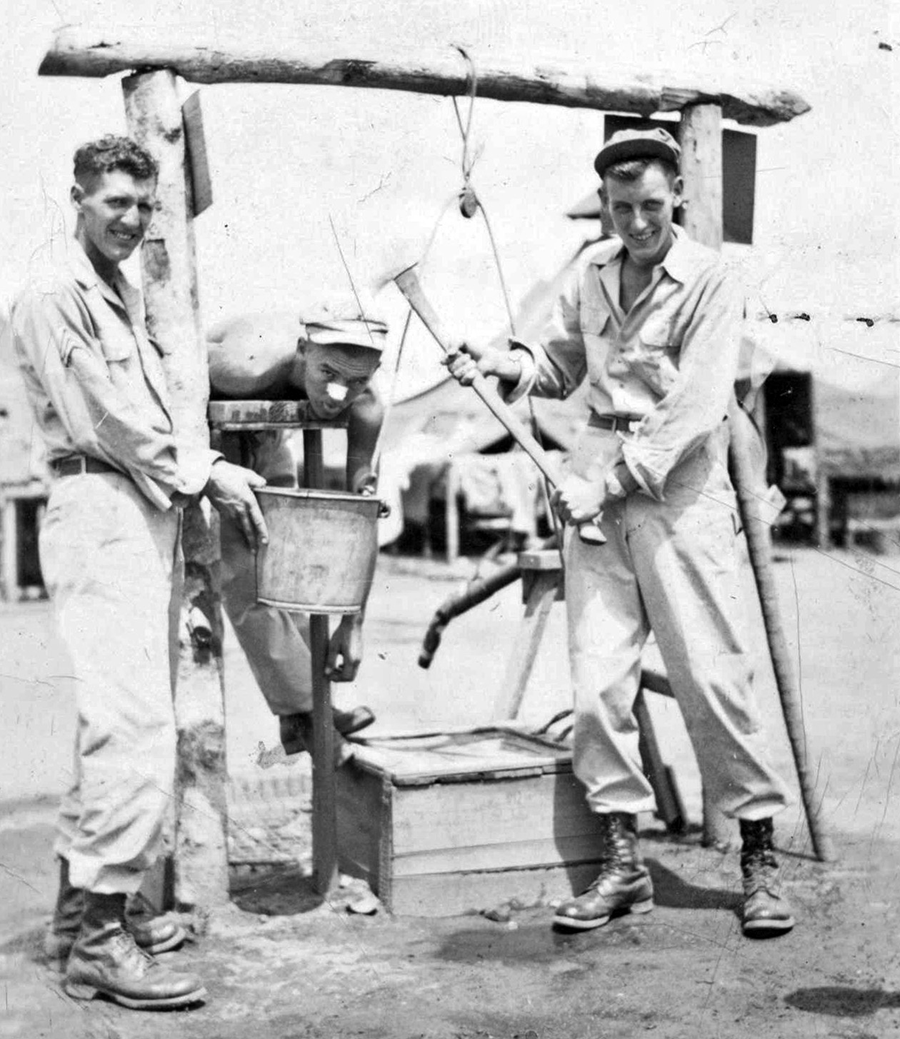 While we were in New Guinea, Gemo, Dubes and I were drinking one time, and Dubes and I did not have to go on guard duty, but Gemo did. So Dubes and I were allright – we could sleep it off. But Gemo kept drinking. Some of the fellows were making jungle juice and putting it in cans under their beds, disguising it. Sorensen had a still in the back somewhere, I think. They were all making that stuff. So Gemo must have fallen asleep on an anvil. All I can remember are those carts like that they used to carry jerry cans in. They had piled Gemo in that with his arms and legs out with his rifle laying on him, pulling him up the street. He was unconscious! Capt. Platt our Medical Officer saw them and he was cussing and carrying on. Another one of Gemo’s adventures….hehehehe
While we were in New Guinea, Gemo, Dubes and I were drinking one time, and Dubes and I did not have to go on guard duty, but Gemo did. So Dubes and I were allright – we could sleep it off. But Gemo kept drinking. Some of the fellows were making jungle juice and putting it in cans under their beds, disguising it. Sorensen had a still in the back somewhere, I think. They were all making that stuff. So Gemo must have fallen asleep on an anvil. All I can remember are those carts like that they used to carry jerry cans in. They had piled Gemo in that with his arms and legs out with his rifle laying on him, pulling him up the street. He was unconscious! Capt. Platt our Medical Officer saw them and he was cussing and carrying on. Another one of Gemo’s adventures….hehehehe
Photo at Right: L to R: Sgt. Robert F. Ingram, Sgt. James Stott, Cpl. William R. Walter. Photo by William Walter, taken at Dobodura, New Guinea
The girls in New Guinea smelled really bad. Training advice to the soldiers: “Keep away from the women and the gardens over here”. We soldiers, for the most part, had no trouble obeying that command.
3rd platoon had a real good soldier: Al Barreiro – a wonderful fellow. Funny what we remember about a guy. When we were down in Tacocca, they made us run from one place to another – we weren’t allowed to walk. We were always trying to avoid the mud down there. It was so muddy our shoes were always a mess, and if we got stuck in it and we were trying to hit the duck boards we were kinda hesitant, and Barrerio would say “Come on, come on, Jocko, keep going you guys. Better men that you are dying in mud like this.” And the ironic part was he died in mud like that on Leyte. A hell of a good soldier: One of the best.
Now on the subject of good soldiers I am probably a little biased, because my friend Bob Steele, I think, was the best soldier I ever knew. Really was. We didn’t like him when he fist came in a a replacement for Sharp because we all liked Sharp. Steele, we thought, was always a know-it-all. But Steel had been in the service before, overseas in Hawaii, and he could do what was called Marine drill with the rifle, and he just knew how to do everything. We thought he was a blow hard but he wasn’t. He really knew his stuff. After I got to know him better we became bonded, and in Leyte he and I were pup tent buddies. We laid there at night discussing what we were going to do when we got out of the service, things like that. We really bonded on Leyte, and I came to admire him so much. He was the kind of man everybody would like to be. This was proven later, because he won the Distinguished Service Medal and later a field commission. When he got killed on Luzon, it really was a terrible blow to me. It really shook me up. It was one of the worst things that happened to me in the service, losing a buddy like that.
Although death is a horrible thing, it was always with us. But sometimes a little humor cropped into the daily activities. I, as the mailman knew when a certain soldier had been killed. After his death, a package came for him. It was my duty to open his effects, and return to the parents or wife anything of value. Booze was an exception. There was absolutely no common sense in returning that item – besides – it might get broken. My buddies and I just quietly polished it off, with a toast to our departed comrade.
On Leyte, a group of soldiers were unloading, and apparently they began pilfering anything they could get their hands on. Juice was of particular interest. Losses did not get reported. The Officers, for the most part, looked the other way. We were known as Ali Haugen and his 2,000 thieves. But somehow General Swing found about the rampant pilfering and his response when confronted: “Why my boys couldn’t have done anything like that – They’re Angels”. We later became know as Swing’s 10,000 thieves.
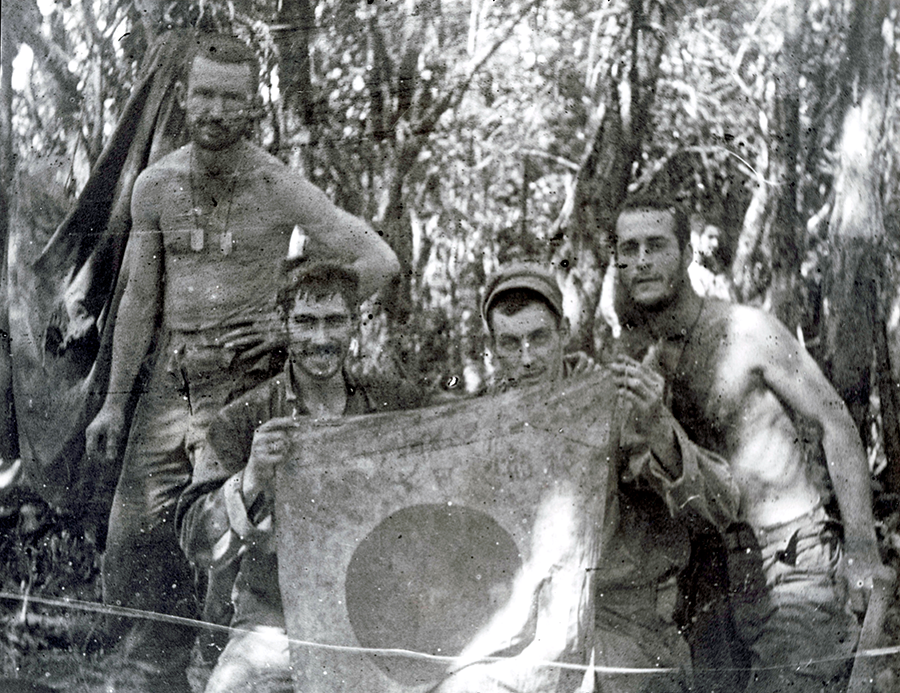 Oh, we had so many things happen you wonder….I remember one time we were on a mission on Leyte. We were stuck up on Starvation Hill, we called it, and we were not getting much to eat up there. We were socked in with fog and the pilots could not air drop to deliver food. They first tried with parachutes, but the parachutes would drift over and the Japs would get it. So they ended up flying over with L5’s and just dumping the boxes out. We all had to be on our toes, because the boxes came flying down just like bombs. I recall one time Col. Shipley was standing up on top of the hill saying “Chow, chow, chow” as the pilots came over and so the pilots came over and just gave the supplies a push out of the door. Boxes were flying all over, over trees and stumps, and Shipley was saying “Bring the boxes – pile them over here”. Red Metheney and I were standing there, and one landed near us and split open, spilling out a couple of cans which I grabbed and slid under my field jacket. But this is the kind of luck I had: You will never guess what the cans were. Gun oil! I said, “Ain’t that it!”. Ah, that was really awful luck for me.
Oh, we had so many things happen you wonder….I remember one time we were on a mission on Leyte. We were stuck up on Starvation Hill, we called it, and we were not getting much to eat up there. We were socked in with fog and the pilots could not air drop to deliver food. They first tried with parachutes, but the parachutes would drift over and the Japs would get it. So they ended up flying over with L5’s and just dumping the boxes out. We all had to be on our toes, because the boxes came flying down just like bombs. I recall one time Col. Shipley was standing up on top of the hill saying “Chow, chow, chow” as the pilots came over and so the pilots came over and just gave the supplies a push out of the door. Boxes were flying all over, over trees and stumps, and Shipley was saying “Bring the boxes – pile them over here”. Red Metheney and I were standing there, and one landed near us and split open, spilling out a couple of cans which I grabbed and slid under my field jacket. But this is the kind of luck I had: You will never guess what the cans were. Gun oil! I said, “Ain’t that it!”. Ah, that was really awful luck for me.
Photo at Right: L to R: Cpl. Richard L. Matheny, T/5 George R. Lock, Cpl. William R. Walter, S/Sgt. Howard C. Moshier with Japanese "Trophy" battle flag. Taken on Leyte. Photo by William Walter.
On Leyte, Charlie Jones was picked one day to carry as many canteens as he could manage down the hill to a little running stream rushing out of the mountains. He could not carry a weapon for this chore, so two soldiers with rifles went along to protect him. Charlie was about knee-deep in water, busily filling the canteens, when he looked up and saw another soldier – A JAP – doing the same thing. Neither had weapons, so they just stared at each other for a moment, before getting into a fistfight. The two American soldiers were sitting up on the bank, watching the battle and laughing like Hell. They finally shot the Jap, to Charlie’s great relief.
On Leyte we dug up roots to eat and anything we found in our mess kits, our mussette bag. We’d scratch around for a couple of those old cookies that we hated so much, but boy, they tasted like pound cake if we were lucky enough to find a couple.
Another time, on Leyte, Steele showed his mettle. We were trying to break out of a trap where the Japs had us surrounded, and Murray Perlman stopped in middle of a little creek because his shoelaces were untied.. Steele said, ”Hey, Murray you are going to trip and fall”, and he knelt down and tied Murray’s shoelaces. That was so impressive to me. A man of his stature and how he handled himself was one of the things that intrigued me about him.
Well, I guess Leyte was the real testing ground for anybody to prevail. It really showed how much starch we had. After we came out of there, I remember Red Metheney wrote me many years later: “Willie, if you could have seen yourself coming out of there.” I think I weighed about 110 pounds. I had dysentery so bad I just couldn’t stop. The guys tantalized me and said, “Hey, Willie, your pucker string broke”. It is funny now, but it wasn’t at the time. The soles of my shoes were flapping; I had defecated my pants so that I had to throw them away. I did just like the Indians wore – a belt with a piece of cloth to just cover my privates. Made it easy for me to just pull the cloth aside if I had to go to the bathroom, which was often.
We came out of the mountains of Leyte and we were stopped a day or two short of Christmas 1944, and the higher officers said: “Don’t worry, your meal can wait for you when you get there.” They decided that we looked so decimated they did not want the higher officials to see us, so they sent one of the glider regiments who came walking through and went down for our meal. I don’t know who the higher officials were, but they didn’t want them to see us. But our promised dinner was there when we got down. But I tell you that was a mistake! We had only been supplied, I think, 11 days out of the 30, and we were all so hungry we gobbled up everything.
The Christmas Dinner really did have everything: Turkey, stuffing, mashed potatoes, peaches, ice cream – but the trouble was our stomachs had shrunk and 95% of us who ate that dinner upchucked. We just could not hold it down since our stomachs were not used to food. And I recall that I was so dirty and slimy after not having my shoes off and not having a bath in 33 days that I went down and sat where a creek entered the ocean. It was a place where I just sat up to my chin in the water for I don’t know how long. So soothing, it really was. I knew that we all stunk pretty bad. I guess I stunk so bad that I couldn’t smell the other guys, because we were all alike.
That Leyte was the testing ground for us. Even Steve Cavanaugh, who had a lot of Army experience has remarked that it was something that he will remember after 30 years of service. That stuck in my mind.
The Article by Frank Slvich “THE SAGA OF HUNGRY HILL”, which has appeared in “Winds Aloft”, captures the sentiments of all of us who were there.
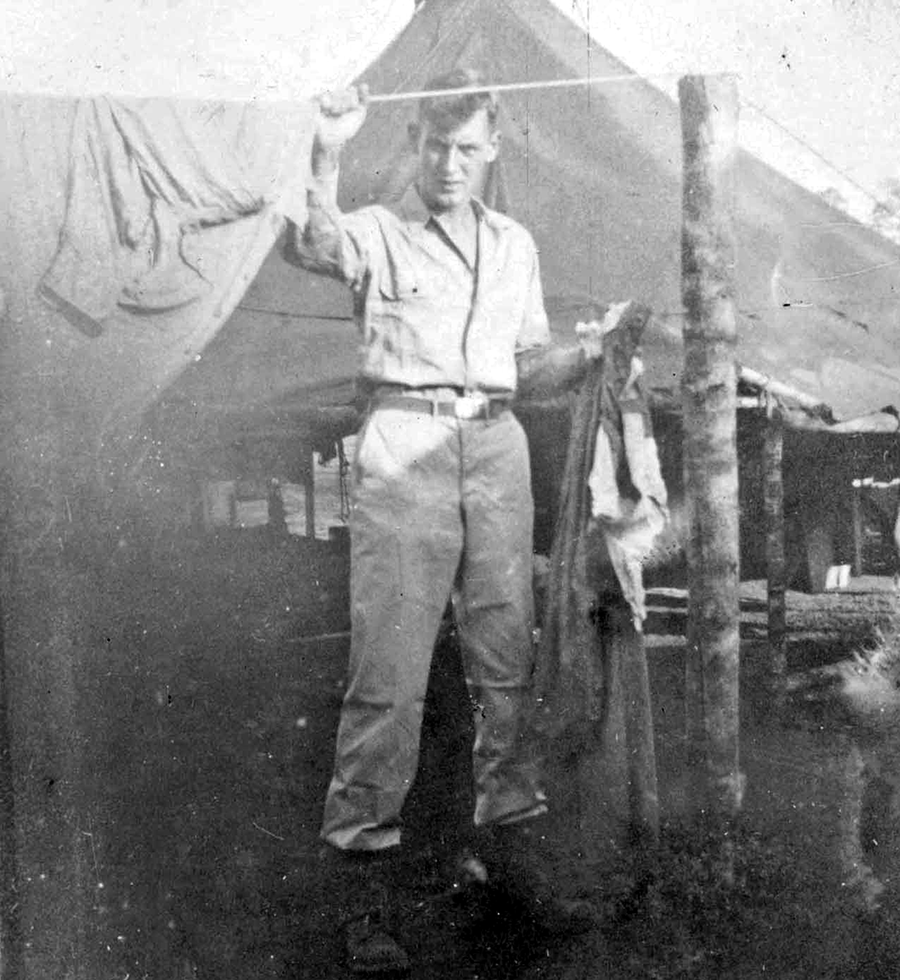 While we were on Okinawa, waiting to be taken to Japan for the occupation duties, we never had enough food. I visited a friend in the Marines, who had open mess hall twenty-four hours a day.
While we were on Okinawa, waiting to be taken to Japan for the occupation duties, we never had enough food. I visited a friend in the Marines, who had open mess hall twenty-four hours a day.
The reason for this open mess was that during the Kamakazia attacks by the Japanese, and the Marines were on duty twenty-four hours a day. I kept taking my friends back to visit my new Marine friend, so that they could get some food, too.
At one of the reunions I was sitting at the table talking about our experiences in Japan. I was the mailman and I would divide the mail between the three platoons. Each person would deliver the mail for a certain platoon. The 3rd platoon was the furtherest away. I forget to whom I gave the mail bag. But these guys got on that Japanese train, and they just took it over. They pushed the conductor and the engineer aside. They kept throwing coal in that thing and they were going faster and faster, they were going down hills. They weren’t supposed to be doing that. They really got in a lot of trouble because the Japanese railroad complained and the officers raised hell, they wanted to know who did that. I said: “I wonder who the simple SOB’s were who did that”, and one of the guys sitting at the table with me said, “Will, I was one of those simple SOB’s.” You know who it was, it was Paul Simpson, back when he was a private. He was a screw-up… HaHaHa….
Funny thing: I had a little mail room – my mail office – by myself in Japan. And across the hall the medics also had a little room. We called it the “Romance Room”. Those guys who had a sexual encounter in town over the weekend had to come in for their shots for venereal diseases. HaHaHa….
My mail room was halfway down those long corridors under roof, like long hallways. My office was half way between the showers and the mess hall. It was cold in Japan and the guys would come dashing down the hall because I had a stove in there, and they would use it for warming up.
We were told not to eat Japanese vegetables because they were fertilized with human feceses. That was a big notice posted on the Bulletin Board. Believe you me, they were the best vegetables you could ever imagine. Everything we had was in a box or a can, dehydrated, or whatever. The first time I got a big onion I took the skin off, rinsed it off and ate it like an apple. That tasted so good - that fresh vegetable – it really was surprising.
Cpt. Hoadly Ryan used to send me down to the docks on Friday to get half a tuna. I rode down with the fellow who drove the truck to haul our water which was supplied to us at a well on the dock.
So I was down there waiting for him to fill up with water, one day, and I was looking around, and there was this little Japanese girl. They were so cute in their kimonos, and the geta shoes they wore. They had black bobbed haircuts, big black eyes. I have a weakness for little girls. They were so cute. One little girl had a big wine sap apple. I looked at that and I said “Apple” and I don’t know how it transpired but eventually we made a swap – chewing gum for an apple. The next time there were a couple more girls who had come over – And for a chocolate bar and candy I was getting an apple - Oh, it had been so long since we had a good apple. I had a regular entourage after a while. Those little girls were after me for the candy bars and chewing gum, and we made a big swap every Friday. I’d take the apples back to the guys – Oh they were delicious. Then I found out Washington State is supposed to be famous for apples and we are on the same parallel as Japan – I guess the temperature is the same, and they produce the same apples.
Guess I don’t have to tell you, Andy and Jane, about Al Haar. I would just like to give some of my sentiments as I think about combat medics. They are a breed of men by themselves. They do one of the most brave acts that can be done in the service, because the minute a wounded person calls for them, they go without hesitation forgetting the fact that they are in the line of fire – the same line of fire that wounded the person they are tending to. I have a special regard for anybody who was a combat medic, and Al Haar was a special one, but you know that, Andy (Lt. Carrico).
*William married Elizabeth W. Tait on August 16, 1947 in Allegheny, Pennsylvania.
What an appropriate ending to a wonderful recollection of memories from Bill Walter’s time in the United States Army. Walter’s story has touched me, as I am sure it will all of you who read it.
A job well done, Walter. Thank you so very much.
Transcribed by Jane Carrico July 2004.
PUBLISHED IN WINDS ALOFT Issue 77 Fall 2006
Official Obituary
Bill Walter was active after the war. He was elected Vice-president of the 11th Airborne Division Reunion Association 1975 – 1977.
Burlington County Times - Formerly of Maple Shade
William R. Walter III died on February 24, 2009 in West Palm Beach, FL.
Born in Philadelphia, Bill was 86 years old. Bill lived in Maple Shade for 26 years before moving to West Palm Beach in 1981. He was the owner of Bill Walter's Inc. in Maple Shade, where he sold and installed windows, doors, jalousies and awnings products. Bill proudly served his country in the 511 Paratrooper Infantry during WWII.
Beloved husband of the late Lois M. Walter. Loving father of William R., IV and his wife, Debbie of Colmar, PA and Joyce Marten and her husband Al of Cinnaminson. Grandfather of Amy Gould, Melanie Marten, the late Will Gould, Christine Walter, William R. Walter, V, and Shannon Walter. Bill is survived by his lady friend, Eleanor Darr and brother of Miriam Weimar of Philadelphia and Richard Walter of Silver City, NM.
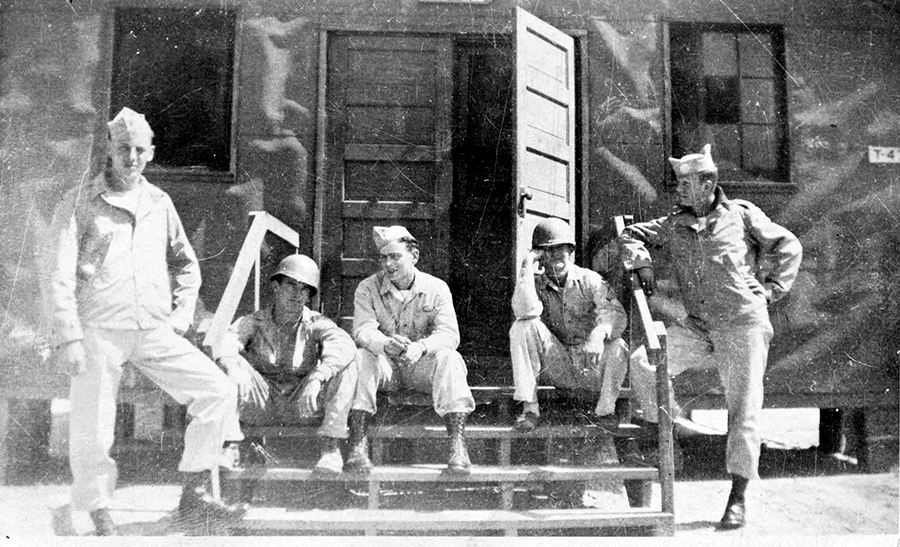 L to R: Cpl. William R. Walter, Thompson, Pvt. Bart A. Howey, Sgt. Robert F. Ingram, Pfc. Richard A. Goff at Camp Mackall (Photo by Willam Walter) |
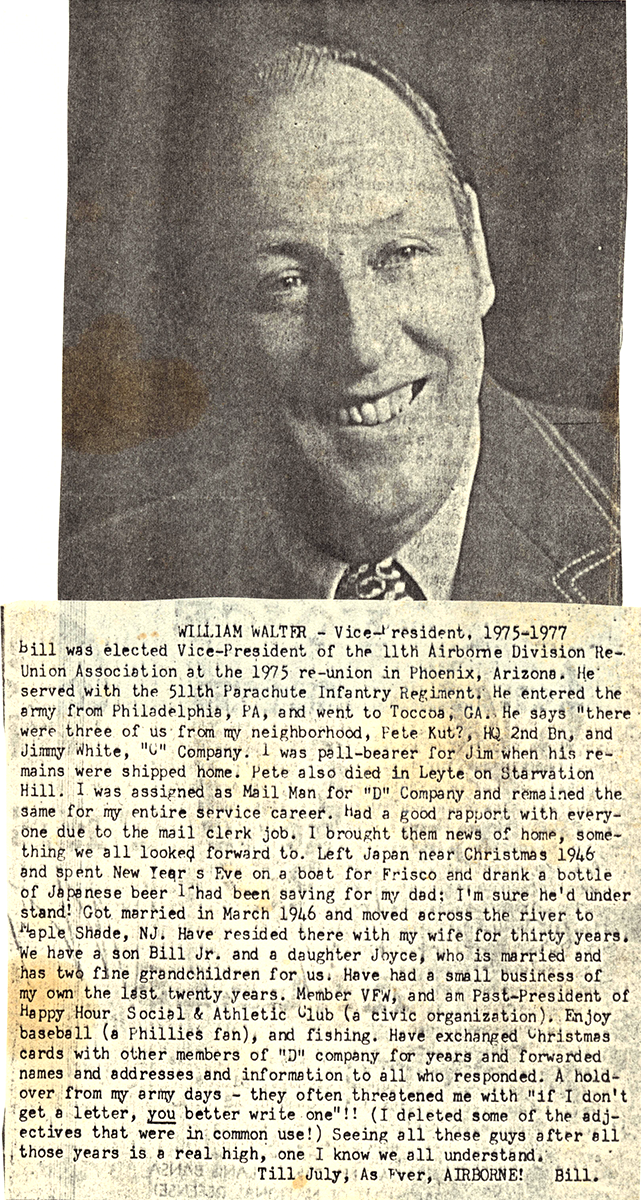 |
|
William R. Walter, Vice President of the 11th Airborne Association (courtesy of William Walter) |
If you would like to learn more about William's exploits within and the history of the 511th Parachute Infantry Regiment in World War II, please consider purchasing a copy of the book WHEN ANGEL'S FALL: FROM TOCCOA TO TOKYO, THE 511TH PARACHUTE INFANTRY REGIMENT IN WORLD WAR II, available in the regimental online store, on Amazon or wherever military history books are sold.
